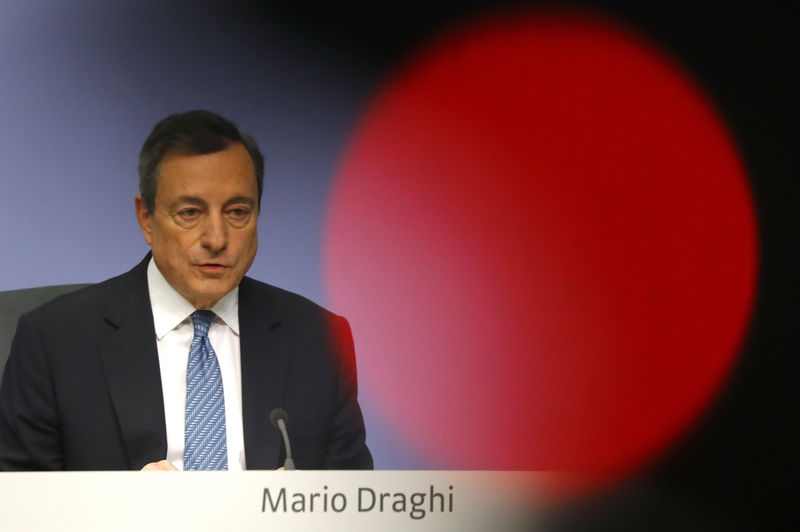By Balazs Koranyi and Francesco Canepa
FRANKFURT (Reuters) - The European Central Bank officially ended on Thursday its lavish post-crisis asset purchase scheme but promised to keep feeding stimulus into an economy struggling with an unexpected slowdown and political turmoil.
Having long flagged the end of quantitative easing, the ECB had little choice but to stop the bond buys. But it signaled it would take its time before tightening policy any further given slower growth, a looming trade war, the prospect of a hard Brexit and budget tensions in Italy and France.
"Continuing confidence and increasing caution," was how ECB President Mario Draghi at his news conference described the Bank's basis for ending the 2.6 trillion euro ($2.95 trillion), four-year-long QE scheme.
Asked for an assessment of how effective he thought the unprecedented stimulus package had been in helping the euro zone to emerge from the 2007/08 financial crisis, he said that for some of the last four years QE had "been the only driver of this recovery".
Hoping to reassure markets, the ECB earlier repeated its promise that rates would be kept at their current record lows at least through next summer and that it would keep open-ended the time horizon for reinvesting cash from maturing bonds.
"The Governing Council intends to continue reinvesting, in full, the principal payments from maturing securities purchased under the APP for an extended period of time past the date when it starts raising the key ECB interest rates," the ECB said. That was a tweak to its previous guidance that reinvestments would continue for an "extended period" after bond buys end.
Draghi said the decision on reinvestments was unanimous.
With Thursday's decision, the ECB's rate on bank overnight deposits, currently its primary interest rate tool, remains at -0.40 percent, while the main refinancing rate, which determines the cost of credit in the economy, remains at 0.00 percent.
For an EXPLAINER on life after QE, click on:
For a Graphics story on the ECB's bond buys, click on
SWEETENERS
The ECB's problem is that growth is weaker than policymakers thought even just weeks ago, while the predicted rise in underlying inflation has failed to materialize, putting in doubt some of the bank's assumptions about the broader economy.
Its latest projections put euro zone growth at 1.9 percent and 1.7 percent for this year and next, respectively, each 10 basis points lower from the ECB's last forecasts in September. It put 2018 inflation at 1.8 percent -- up from an earlier 1.7 percent estimate -- but saw it slightly lower next year than previously, at 1.6 percent.
Overall inflation may be near the ECB's target of near 2 percent now but falling oil prices suggest a dip in the months ahead and a solid rise in wages is not feeding through to prices, leaving the bank with an unexplained disconnect.
The new forecasts, coupled with his comment that the balance of risk was now tilted towards the downside, caused the euro to weaken 0.3 percent against the dollar and German 10-year bond yields (DE10YT=RR) to fall more than a basis point .
Draghi said the bank would detail in a 1430 GMT news release later how the bank would reinvest cash -- about 200 billion euros next year. While most of these decisions are expected to be technical, they should give the ECB enough flexibility to provide support.

($1 = 0.8824 euros)